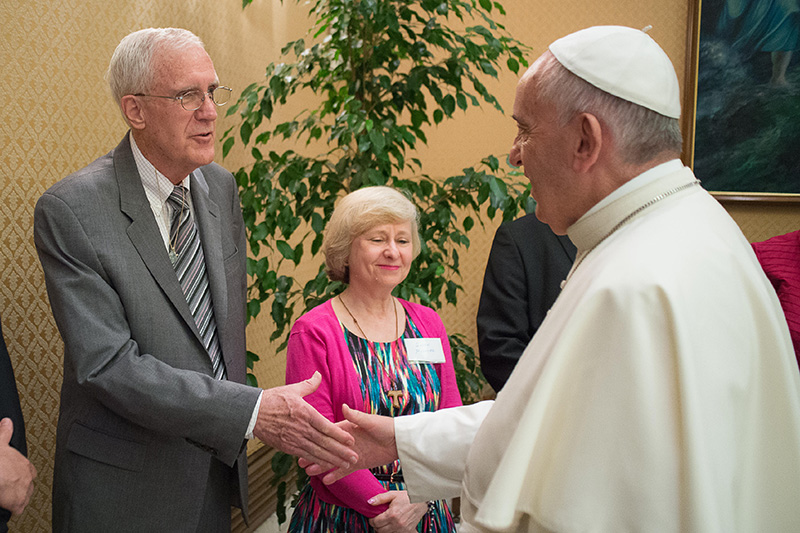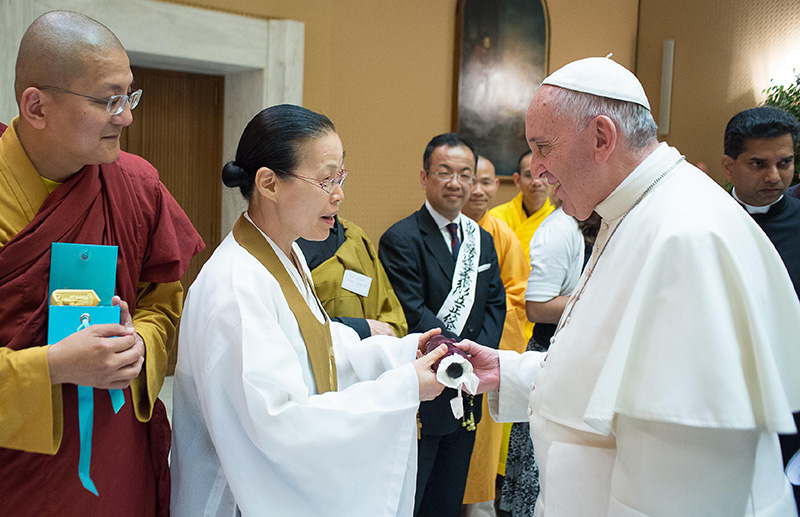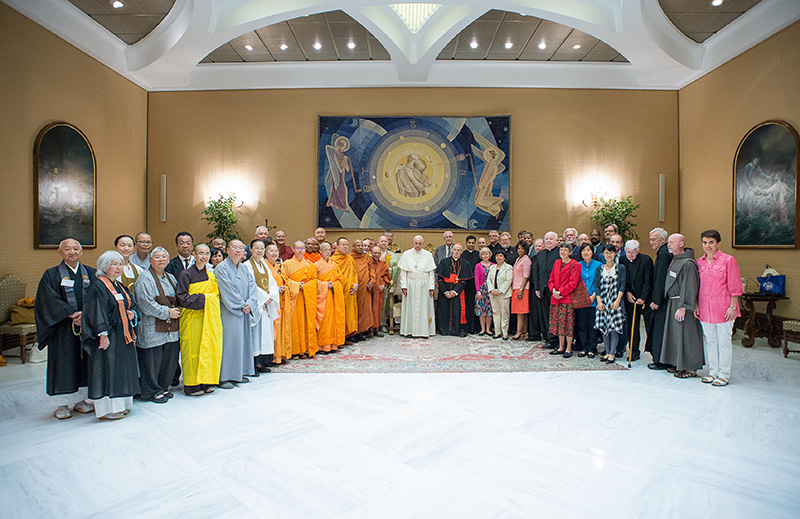A faithful partnership
Professor emeritus drives Catholic-Buddhist green housing project

As someone who has practiced both religions at points in his life, Donald Mitchell is uniquely qualified to serve as an intermediary between Buddhists and Catholics.
The professor emeritus of philosophy has long participated in dialogues between the two faith groups, and more recently undertook what he described as a capstone project in interreligious cooperation. With encouragement from Pope Francis, Mitchell is helping Buddhist and Catholic leaders in New York City, Chicago, and Los Angeles collaborate to develop green, affordable housing properties for those in need.
“These places are going to be permanent,” Mitchell said. “You’re talking about safe homes with social services, job training, et cetera, for hundreds of individuals, families, and elderly couples. Hopefully, it will become a model for other religious groups to work together.”
According to Mitchell – who practiced Buddhism before converting to Catholicism in 1973 – interfaith organizations are not especially unique in major metropolitan areas, but this Buddhist-Catholic venture marks the first time where the Catholic Church is taking the lead in such an effort.
He credited Pope Francis for inspiring this collaboration.
“The expectation is that this will have ripple effects in other parts of the world in terms of the social interreligious projects of the Church,” Mitchell said. “Pope Francis has been encouraging local churches that they need to reach out to the suffering people in their communities and where possible to do it with other religions. There is resistance, so these three projects are proof that it can be done.”
In that spirit, Mitchell organized a 2015 delegation of 50 U.S. Buddhist and Catholic leaders who focused on addressing social ills at a conference hosted by the Vatican’s Pontifical Council for Interreligious Dialogue. During their private audience with Pope Francis, he praised them for planting “seeds of peace and fraternity” and encouraged them to find ways to take action when they returned to the United States.
“Pope Francis wanted people who worked in communities to get together and talk. Not the scholars. Not the top bureaucrats. That wasn’t his idea,” said the Rev. Patti Nakai, resident minister at the Buddhist Temple of Chicago, who attended the 2015 conference. “He felt we could find common ground – that the concern for our communities was a very common concern, so why not join forces and work to benefit our communities.”
 As a result of their conversations, the groups identified homelessness and the lack of affordable housing as causes they would attempt to tackle. They made plans to develop energy-efficient, affordable apartments, with the Catholic and Buddhist groups collaboratively offering a variety of services to address residents’ needs.
As a result of their conversations, the groups identified homelessness and the lack of affordable housing as causes they would attempt to tackle. They made plans to develop energy-efficient, affordable apartments, with the Catholic and Buddhist groups collaboratively offering a variety of services to address residents’ needs.
In New York, Catholic Charities plans to expand the existing Our Lady of Loreto apartment complex in the Brownsville section of Brooklyn. Its 136 apartments will cater to poor or homeless elderly residents in a crime-ridden area that desperately needs safe housing options.
“We are one of the larger affordable senior housing providers here throughout the city, and we’ve participated with other housing providers and surveyed all of our buildings,” said Timothy McManus, vice president of Catholic Charities Brooklyn and Queens. “Out of 26,000 apartments, we found there are over 200,000 seniors on a waiting list to try and access these. It’s an enormous need here in the city. The Baby Boomers are very quickly aging into this demographic and we try to build as fast as we can, but we find the average senior can wait anywhere from seven to 10 years to just find one of these apartments.”
In Los Angeles, Mercy Housing plans to demolish and then redevelop on the site of a building it purchased at Sixth Street and San Julian in the middle of “Skid Row” – the 50-block area with the highest homeless concentration in the nation. The 95-unit development will house couples, women with children, and homeless residents with special needs.
Mercy Housing is also the developer in Chicago, with plans to renovate and add to the existing Belray Apartments in Lakeview. When complete, the 102-unit property will house single homeless men and single women with or without children. As with the Los Angeles project, Mercy Housing will offer expanded social services to residents that will include programming by Buddhist partners.
“There’s a lot of good DNA in our organization,” said Mark Angelini, president of Chicago’s Mercy Housing Lakefront, a group founded by the Sisters of Mercy in Omaha. “By nature, (the sisters) tend to be very collaborative because, to them, it’s about getting the job done and not having the ego to think that you’re the only one that can get it done. A lot of times, these are very complex issues and people that have come through very complicated traumas, and so we need to interact and reach out to as many partners as we can.
“As not only a fiscal reality or a financial reality, we could never have a budget big enough to cover all the service needs,” Angelini continued, “but these organizations that spring up – whether it’s a religious entity, a faith tradition, a community health provider – they’ve all come from a similar place. They’re here to help people that have been injured.”
 The housing facilities’ available services will include job training, parenting classes, afterschool care, and intensive counseling programs that assist residents who struggle with drug addiction or mental health issues.
The housing facilities’ available services will include job training, parenting classes, afterschool care, and intensive counseling programs that assist residents who struggle with drug addiction or mental health issues.
In addition, Buddhist partners Dharma Drum Mountain, Higashi Honganji, Tzu Chi Foundation, and Won Buddhism will offer services like tai chi, meditation courses, Asian cooking classes, and even employment opportunities.
“The Dharma Drum community is going to be able to participate in providing some services that are already largely popular with our senior, aging population,” McManus said of the New York facility. “They’ll offer lots of different types of meditation – moving meditation, quiet meditation – as well as yoga and Tai Chi, which have immense benefits for keeping seniors mobile and flexible.”
As of this spring, the groups had raised nearly all of the $162 million needed to build and renovate housing facilities in the three cities, requesting the final $5 million in support from the Vatican as a sign of endorsement.
The New York project should be the first to break ground by the end of 2019, with the others expected to follow in the coming months. As the projects move closer to completion over the next couple years, the religious groups in each city will collaborate to finalize plans at the three facilities.
Thus far, the Buddhists and Catholic leaders have met Pope Francis’ challenge to collectively plant seeds of peace. Once these facilities open their doors to those in need, they will also honor Pope Francis’ hope that those seeds would grow into something large.
“There is a common purpose between the two religions, and this is just an opportunity for us to get together at the organizational level and talk about how we can best leverage our strengths and make sure we can do something together, which could be a great demonstration for others to observe,” McManus said.
“The best we can hope for is that we’re a model – a light, if you will, to be poetic – for other communities to see that we can come together in cooperation to try to tackle a social ill.”